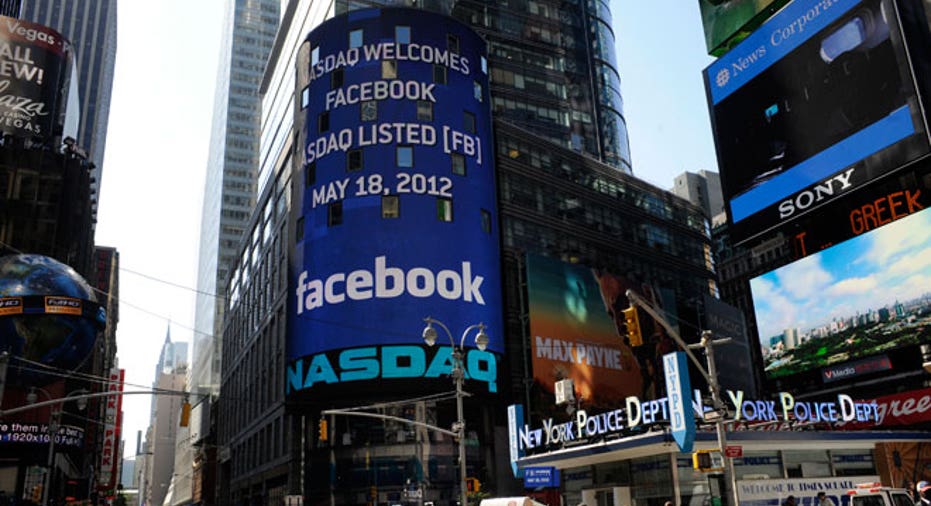Nasdaq May Be on the Hook for Facebook Trading Glitches

Trading snafus at the Nasdaq stock market during last Friday’s initial public offering for Facebook (NYSE:FB) may end up costing the exchange more than its reputation, the FOX Business Network has learned.
Angry traders and investors are bombarding Nasdaq officials with demands that the exchange make good on losses they say were incurred during the messy execution of the Facebook IPO, where Nasdaq systems essentially broke down and failed to execute buy and sell orders for the stock at various times during Friday’s stock sale, according to people with first-hand knowledge of the matter.
These people say that the demands for money could total $100 million or possibly more, but Nasdaq chief executive officer Bob Greifeld is, at least for now, taking the position that the exchange will not cover the losses.
Joseph Christinate, a spokesman for Nasdaq, didn’t return repeated telephone calls or emails seeking comment.
The losses traders say they incurred last Friday because of the Nasdaq glitches have marred what should have been a huge victory for the exchange, snaring the coveted “listing” of Facebook’s highly anticipated IPO. Nasdaq officials worked all week to make sure their trading platform could handle the massive anticipated trading activity. Greifeld flew out to Facebook’s Menlo Park headquarters to be with Facebook CEO Mark Zuckerberg for the “opening bell,” and the scheduled 11 a.m. ET start of trading.
Back in New York, Nasdaq officials opened a bottle of champagne as the debut grew closer.
But the opening was delayed for more than a half hour because problems involving order confirmations, the Nasdaq said at time. Similar problems with matching orders persisted throughout the afternoon; at one point Greifeld weighed whether to halt trading of Facebook shares so the exchange could better sort out the issues, people close to the exchange tell the FOX Business Network.
In the end, Nasdaq officials decided to work through the snafus because a pulled deal would be too reminiscent of the disastrous IPO for BATS Global Markets back in March, where trading system glitches forced the exchange to pull the offering that it was attempting to sell on its own platform, these people say.
But that didn’t satisfy angry traders and investors who say orders for shares of Facebook went unfilled for hours, and cost them money. Shares of Facebook were priced at $38, quickly moved to around $42 dollars, but ended the day about where they started at $38.23.
As orders to buy and sell stock went unfilled investors remained in limbo and the market moved against their positions. People close to Nasdaq say the losses alleged by traders and investors who have complained to the exchange have been estimated at around $100 million; but others say the amount could rise to as much as $200 million.
“Let’s hope Mr. Greifeld does the right thing, the gentlemanly thing and makes us whole,” one trader told the FOX Business Network. “This is worse than BATS because they at least pulled the deal; my clients were in limbo all day.”
Another trader told the FOX Business Network that his client lost close to $1 million because of the Nasdaq system failures.
It’s unclear if Nasdaq has any legal obligation to repay investors for possible losses stemming from the malfunction. Traders say late Friday they were told by Nasdaq officials that the exchange would hold an “off line” or manual auction of unmet orders.
But such an auction would be voluntary and Investors who placed an unmet order to buy shares above the closing price would have little incentive to participate.
If Nasdaq doesn’t make some accommodations to investors it might be risking its reputation further. Facebook officials and underwriters for the deal were angered by the glitches and said the problems hurt the pricing of the deal, according to people close to the matter.
A Facebook spokesman wouldn’t deny that the company is upset with the Nasdaq’s handling of the IPO.
Meanwhile, officials at the rival New York Stock Exchange were quietly gloating over the stumble. The NYSE fought hard for the Facebook listing, but ultimately lost to Nasdaq, which during its sale pitch boasted its edge in the trading of stocks of the world’s biggest technology outfits, like Google, Microsoft and Apple.
“The Nasdaq’s handling of this issue is the best advertisement the NYSE could dream of,” said one NYSE floor trader.



















